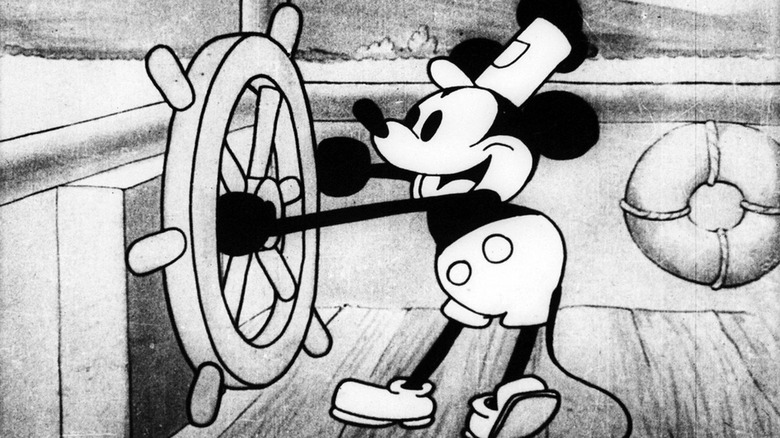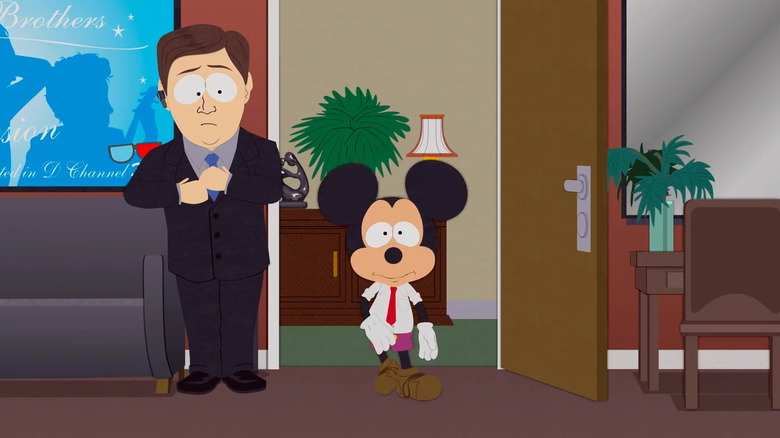Is Mickey Mouse Finally In The Public Domain? Nope, Says Disney
The story of how Disney locked away two decades' worth of art, music, film, and literature from the public domain — all for the sake of preserving its ownership of the copyright of Mickey Mouse — is well-known by now ... though it's become rather distorted in the storytelling. Though the Copyright Term Extension Act of 1998 is derisively nicknamed "The Mickey Mouse Protection Act," and did indeed extend the copyright protection for the original incarnation of The Walt Disney Company's most recognizable character, it wasn't the result of a solo effort by Disney. There was a much broader lobbying campaign, and everyone from Time Warner to the estate of George Gershwin got in on it.
Still, Disney being the figurehead for the legislation has created a public countdown to today — January 1, 2024, aka the day that "Steamboat Willie" enters the public domain. The 1928 short film marked the first public appearance of the earliest incarnation of Mickey Mouse, Disney's most literally iconic character. In 2018, when the Copyright Term Extension Act was set to run out, Ars Technica did some digging and found no indication that corporations were planning to lobby for another extension. Works began entering the public domain again in 2019, and this year "Steamboat Willie" and another 1928 Mickey Mouse short, "Plane Crazy," will join them.
So, does that mean we'll be getting a Mickey Mouse horror movie along the same lines as "Winnie the Pooh: Blood and Honey"? Can you start selling Mickey Mouse merchandise legally without giving Disney a cut of the profits? Not so fast, says the Mouse House.
'You think the public is in control here, ha-ha? I'm in control!'
I'm going to get in an early contender for "understatement of the year" here: copyright law is complicated. It becomes even more complicated when it intersects with trademark law, but the bottom line is that copyright protects works and trademark protects brands. For that reason, there's no time cap on registered trademarks: as long as corporations keep renewing their registration every 10 years, they can protect product names, logos, and character designs indefinitely.
Though the "Steamboat Willie" short as a complete work has now entered the public domain, both the name "Mickey Mouse" and the modern design of Mickey Mouse as we know him — with his distinctive white gloves — are registered trademarks. In a statement to CNN, a Disney spokesperson made it clear that not much will change in 2024:
"Ever since Mickey Mouse's first appearance in the 1928 short film 'Steamboat Willie,' people have associated the character with Disney's stories, experiences, and authentic products. That will not change when the copyright in the 'Steamboat Willie' film expires. More modern versions of Mickey will remain unaffected by the expiration of the 'Steamboat Willie' copyright, and Mickey will continue to play a leading role as a global ambassador for the Walt Disney Company in our storytelling, theme park attractions, and merchandise."
You may even run into trouble if you try to use the most famous image from "Steamboat Willie" — of Mickey Mouse spinning the steamboat wheel and cheerfully whistling the old vaudeville tune "Steamboat Bill." Walt Disney Animation Studios made that part of the original short into a production logo, which is now one of numerous registered trademarks featuring Mickey.
Copyright or no copyright, the mouse always wins. (Well, almost always.)

